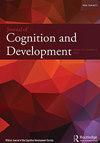幼儿从叙事书中学习科学:语篇衔接与照顾者语外话语的作用
IF 2.1
2区 心理学
Q3 PSYCHOLOGY, DEVELOPMENTAL
引用次数: 0
摘要
摘要支持幼儿事实学习的一种方法是通过共享读书(与知识渊博的人一起读书)。许多教授事实内容的书都是叙事结构,其中事实内容嵌入虚构的故事情节中。然而,我们对影响儿童从叙事类书籍中进行事实学习的因素的认识还存在差距。在这项实验中,来自美国东南部的38名看护者和他们4到5岁的孩子参加了这项实验。每个看护人给孩子读两本关于科学概念的叙述书。这些书的衔接水平各不相同(例如,在文本元素之间建立联系,提供细节和比较)。我们在阅读时对看护者的语外谈话进行编码,以确定其强调科学信息(信息性高亮谈话)或超越文本提供进一步相关信息(信息性详细谈话)的程度。儿童对书籍的科学和故事内容的回忆以自由和探究的形式进行了测试。我们发现孩子们对故事内容有更高的回忆,即使照顾者通过他们突出的课外谈话来强调科学内容。看护者对低衔接的书进行了更详细的文本外对话,这可能是对书缺乏衔接的补偿。然而,儿童对科学内容的回忆最强烈地预测了书籍的凝聚力和照顾者强调的课外谈话。这些结果强调了书籍的文本特征和阅读过程中照顾者的语外对话对幼儿从叙事书籍中学习事实的重要作用。我们特别感谢Britney Del Solar、Laura O 'Hanlon、Jelena Pejic和Rachel Shanahan,感谢他们在转录和编码方面的帮助,也感谢Emory记忆实验室的其他成员在本研究的各个阶段所做的贡献。我们也感谢参与这项研究的儿童和照顾者。这项工作的各个方面在第74届儿童发展研究学会双年会上进行了介绍。披露声明作者未报告潜在的利益冲突。本研究得到了国家科学基金会奖# 1911639和尤尼斯·肯尼迪·施莱弗国家儿童健康与人类发展研究所奖# F32 HD100176-02给希拉里·e·米勒-戈德华特的支持。本文章由计算机程序翻译,如有差异,请以英文原文为准。
Young Children’s Science Learning from Narrative Books: The Role of Text Cohesion and Caregivers’ Extratextual Talk
ABSTRACTOne way to support young children’s factual learning is through shared book reading (reading books with a knowledgeable other). Many books that teach factual content are narrative in structure, in which factual content is embedded within a fictional storyline. However, there are gaps in our understanding of factors influencing children’s factual learning from narrative books. In this experiment, 38 caregivers and their 4- to 5-year-old children from the Southeastern United States participated. Each caregiver read to their child two narrative books on science concepts. The books varied in their levels of cohesion (e.g. drawing connections between textual elements and providing details and comparisons). We coded caregivers’ extratextual talk while reading for the extent to which it emphasized science information (informational highlighted talk) or went beyond the text to provide further related information (informational elaborative talk). Children’s recall of the books’ science and story content was tested in free and probed recall formats. We found that children had higher recall of the story content, even though caregivers emphasized the science content through their highlighted extratextual talk. Caregivers used more elaborative extratextual talk with the low cohesion book, perhaps as compensation for the book’s lack of cohesion. However, children’s recall of the science content was most strongly predicted by the books’ cohesion and caregivers’ highlighted extratextual talk. These results emphasize the important role that books’ textual features and caregivers’ extratextual talk during book reading have on young children’s factual learning from narrative books. AcknowledgmentsWe give special appreciation to Britney Del Solar, Laura O’Hanlon, Jelena Pejic, and Rachel Shanahan, for help with transcriptions and coding as well as to other members of the Memory at Emory laboratory for their contributions to various stages of this research. We also thank the children and caregivers who participated in this research. Aspects of this work were presented at the 74th Biennial Meeting of the Society for Research in Child Development.Disclosure statementNo potential conflict of interest was reported by the author(s).Additional informationFundingThis research was supported by the National Science Foundation award # 1911639 and Eunice Kennedy Shriver National Institute of Child Health & Human Development award # F32 HD100176-02 to Hilary E. Miller-Goldwater.
求助全文
通过发布文献求助,成功后即可免费获取论文全文。
去求助
来源期刊

Journal of Cognition and Development
Multiple-
CiteScore
4.00
自引率
0.00%
发文量
29
期刊介绍:
The Journal of Cognition and Development is the official journal of the Cognitive Development Society (CDS). Some CDS members are concerned with basic research or theory; others focus on policy issues and practical applications. The range of interests includes cognitive development during all stages of life, and we seek to understand ontogenetic processes in both humans and nonhumans. Finally, their interests encompass typical as well as atypical development, and we attempt to characterize both biological and cultural influences on cognitive change and continuity.
 求助内容:
求助内容: 应助结果提醒方式:
应助结果提醒方式:


